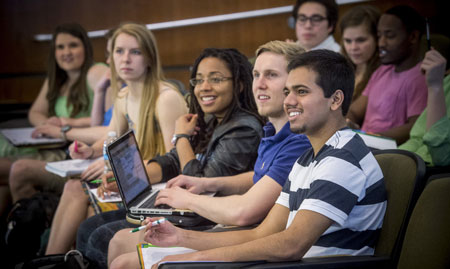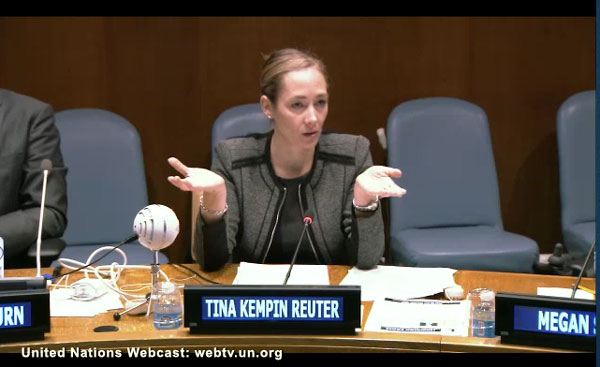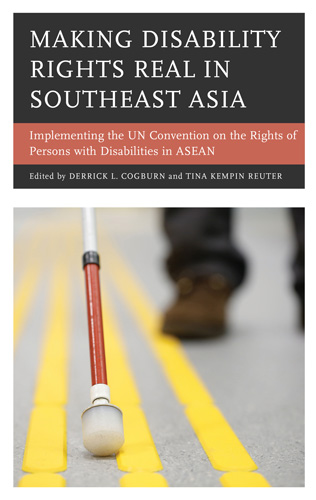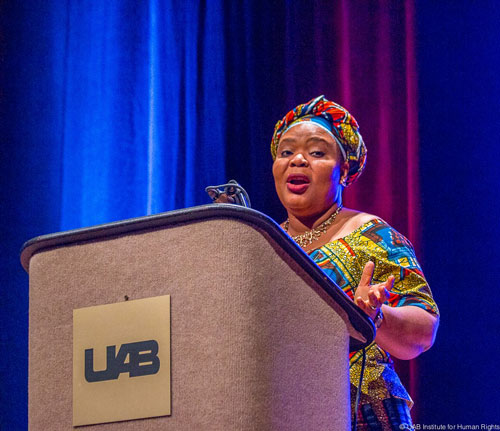Focus
Studying Human Rights from the Bottom Up
The Institute for Human Rights serves as a platform for research and education on human rights with a particular focus on the struggle of vulnerable and marginalized populations, including minorities, refugees, women, children, persons with disabilities, members of the LGBTQ community, and people dealing with the consequences of poverty. The IHR’s content-related emphasis is on the social movements associated with human rights — the bottom up approach and grassroots efforts that lead to empower communities to claim their human rights.
The IHR engages in three different ways:
Education
The IHR strives to educate students, faculty, and the community locally, nationally and globally on the content of human rights, human rights implementation, and issues relating to human rights violations.
Research
The IHR serves as a platform for individual and collaborative research on human rights with a particular focus on the human rights of marginalized populations around the world.
Outreach
The IHR engages with communities in Birmingham, in Alabama, the U.S. and around to world to discuss pressing human rights issues, to provide context on human rights implementation, and to offer human rights education.
Education

UAB
The IHR contributes to UAB's academic curriculum in human rights on both the graduate and undergraduate level.- Masters in Anthropology of Peace and Human Rights
- Minor in Human Rights
- PSC 316: Human Rights
In addition, we offer internships for undergraduate students and help sponsor graduate research and teaching assistants. We provide mentorship for UAB students interested in human rights and encourage them to participate in the IHR-related student organization
Beyond UAB
Through our community education and training programs, we enable marginalized communities to speak up and defend and promote their own human rights. Our goal is to help these communities to create an environment in which the political, economic, and social conditions allow every human being to be equal in dignity and rights. A large part of this educational outreach is our blog, in which we cover and explain what human rights are, discuss institutions dealing with human rights implementation, and raise awareness for human rights violations around the globe.Using best practices of Human Rights Education (HRE), we develop community-based campaigns to train civil society leaders as human rights promoters, educators, and implementers in their own communities. We engage our neighbors here in Birmingham, AL, in populations in other cities across the U.S., and work on international projects (among others, in Kosovo and Jamaica). In all cases, we are working closely with local partners, law enforcement agencies, local shelters, and NGOs in all of our projects.
Research
 IHR Director Dr. Tina Kempin Reuter speaking at the UN International Day of Persons with Disabilities, 2 December 2016. IHR's research, in collaboration with UAB Social Science and Justice Research, focuses on the study of human rights, the struggle and empowerment of underserved communities, human rights violations, health equity from a structural perspective, and social justice. One of the IHR main goals is to engage in international research in collaboration with other centers and researchers on campus and with leading national and international universities. Our research portfolio includes both theoretical and applied perspectives and is focused on the following themes:
IHR Director Dr. Tina Kempin Reuter speaking at the UN International Day of Persons with Disabilities, 2 December 2016. IHR's research, in collaboration with UAB Social Science and Justice Research, focuses on the study of human rights, the struggle and empowerment of underserved communities, human rights violations, health equity from a structural perspective, and social justice. One of the IHR main goals is to engage in international research in collaboration with other centers and researchers on campus and with leading national and international universities. Our research portfolio includes both theoretical and applied perspectives and is focused on the following themes:- Human rights of marginalized populations, with a particular focus on
- Rights of persons with disabilities
- Rights of ethnic minorities and sub-state groups across the world
- Rights of refugees and migrants
- Rights of women and children
- Rights of persons affected by poverty
- Human rights education as a tool to empower marginalized voices
- Combining a “top down” approach to human rights (focus on the United Nations) with a more community-centered “bottom up” approach to human rights
We believe that while a movement towards more inclusive and accessible international governance has opened up opportunities for NGOs, civil society actors, and individuals to participate in international politics, marginalized voices are still limited in their overall impact. We are interested in studying the patterns of oppression and marginalization of vulnerable communities and groups and the way in which these groups develop their voice in international governance as systems of oppression and empowerment show similarities across different marginalized populations. For this purpose, IHR's researchers engage in community-based, interdisciplinary, and mixed-methods research.
Human Rights, Grassroots Engagement, and Technology
We are interested in exploring how universal, international norms laid down in the Universal Declaration of Human Rights and international human rights treaties translate to the regional, local, and grassroots levels as a way to empower people and inspire policy change. Because technology is often cited as one way to promote inclusion of marginalized communities, we study opportunities and challenges presented by information and communication technologies (ICTs) and other technological innovations for human rights, accessibility, and inclusion.Publications Include:
Tina Kempin Reuter. “Human Rights and the City: Including Marginalized Communities in Urban Development and Smart Cities.” Journal of Human Rights (2019).
IHR Director Dr. Reuter is a Technology and Human Rights Fellow at the Harvard Kennedy School’s Carr Center for Human Rights Policy, studying the nexus between human rights and smart cities.
Rights of Persons with Disabilities
 In collaboration with the Institute on Disability and Public Policy at American University, the IHR is working on multiple project relating to the implementation on the UN Convention on the Rights of Persons with Disabilities (CRPD).
In collaboration with the Institute on Disability and Public Policy at American University, the IHR is working on multiple project relating to the implementation on the UN Convention on the Rights of Persons with Disabilities (CRPD). Making Disability Rights Real in South East Asia: Implementing the UN Convention on the Rights of Persons with Disabilities in ASEAN, ed. Derrick L. Cogburn and Tina Kempin Reuter. Lanham, MD: Lexington Books, 2017.
Rights of Ethnic Minorities and Sub-state Groups
The implementation of minority rights is one of the core areas of expertise of our IHR Director, Dr. Tina Kempin Reuter. Her research examines how international minority rights contribute to ethnic conflict resolution and how they have been interpreted to empower ethnic groups on the state and international level. Notable publications include:Tina Kempin Reuter. “The Right to Self-Determination of Ethnic Groups: The Canton of Jura in Switzerland.” International Journal on Minority and Group Rights, 23/2 (2016): 250-269.
Tina Kempin Reuter. “Including Minority Rights in Peace Agreements: A Benefit or Obstacle to Peace Processes after Ethnic Conflicts?” International Journal on Minority and Group Rights, 19/4 (2012): 359-397.
Tina Kempin Reuter. “Dealing with Claims of Ethnic Minorities in International Law.” Connecticut Journal of International Law, 24/II (Spring 2009): 201-237.
Tina Kempin Reuter. “Simulating Peace Negotiations: A Case Study of the Arab-Israeli Conflict.” Simulation & Gaming 47/5 (2016): 1-19.
Learn more about the research of IHR Faculty Associates
Outreach
 As part of the IHR’s outreach mission, we organize public lectures, panel discussions, and roundtables to raise awareness for human rights and human rights violations around the world. Past programs included a lecture by Nobel Peace Prize Winner Leymah Gbowee of Liberia, Ambassador Ahmet Shala of the Republic of Kosovo, and Dalia Mogahed, a leading scholar on Islamophobia at the Institute for Social Policy and Understanding. See our Events page for a full list of upcoming and past programs.
As part of the IHR’s outreach mission, we organize public lectures, panel discussions, and roundtables to raise awareness for human rights and human rights violations around the world. Past programs included a lecture by Nobel Peace Prize Winner Leymah Gbowee of Liberia, Ambassador Ahmet Shala of the Republic of Kosovo, and Dalia Mogahed, a leading scholar on Islamophobia at the Institute for Social Policy and Understanding. See our Events page for a full list of upcoming and past programs.In addition, we work closely with government agencies and NGOs locally, regionally, nationally, and internationally to develop policy solutions and to serve as a forum for discussion, training, and human rights practice.
Watch what UAB students have to say about their experience with identity, marginalization, and human rights.
Stand As One Alabama by Kenzie Greer from UAB Media Studies on Vimeo.
